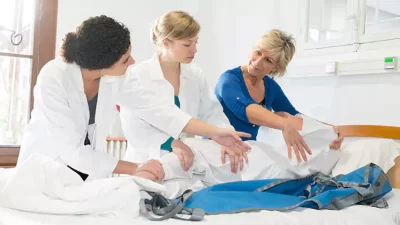Accidents in the workplace are inevitable, particularly if you’re working in an inherently hazardous environment. No matter how careful you might be, workplace injuries can be quite common and frequent. While you may not predict these occurrences, you have more control over their outcome. What’s important is you act on the injuries as soon as possible.
As employees, getting injured while in the workplace entitles you to a lot of rights, but this doesn’t mean it’s automatic without any action on your part. Proper notification to your superiors is necessary. After, that’s when you can start your claim for compensation from an injury.
Here are some of the things you have to do if you’ve been injured at the workplace:
1. Notify Your Employer
The first thing you have to do after the accident is to notify your employer. They have to be made aware of what happened, so proper action can be taken. Notify your employer about the circumstances surrounding the workplace accident and other pertinent details like the time and individuals involved, among others.
Depending on where you’re from or the local laws in your jurisdiction, the consensus is that the employer doesn’t have any obligation to provide benefits, not until the claim form is completed. This ensures the notification is made in writing with the proper record. Nonetheless, a rule of thumb is to make sure everything is duly noted and have a backup copy of the documents.
2. File Your Claim With The Workers’ Compensation Court
Local laws also mandate the existence of a Workers’ Compensation Court or any of its equivalent in your area. This is the body responsible for handling all claims relating to workplace compensation. So, it’s just fitting that after notifying your employer of your injuries, you also file your claim with this body.
This is where the expertise of a lawyer comes in. When you don’t know the ins and outs of this process, it’s your attorney who can walk you through every step of the way. This ensures you’re always within the proper procedures and you aren’t missing out on any important step. Otherwise, even the smallest mistake may hurt your claim’s success.
3. Keep All Records Of Your Expenses
You’re entitled to compensation for the days absent from work because of the injury. Along with this, you’re also entitled to compensation for any out-of-pocket medical expenses you may have incurred. But for you to prove these exist, you also need to show proper documentation.
Therefore, it’s necessary to keep a copy of all the medical expenses you incur. Being prudent in this aspect will make it easier for you to prove that such expenses occurred and that you’re entitled to reimbursement. Also, this would make it easier for the company to settle the accounts.
4. Know What Your Rights Are
An employee’s right to compensation usually varies from one state to another, so it’s best to check with your attorney as to what these rights are. That way, you’d be aware as to what you’re entitled to and what you aren’t. Also, it’s significant to know what your personal rights are, so you’d know that your situation isn’t being taken for granted.
Generally, these are the workers’ compensation rights, which may be common across numerous jurisdictions. Here are some important details:
- You have the right to be represented by a lawyer of your choice in the whole process;
- You have the right to file your claims in any workers compensation court;
- You have the right to appeal to any decision your employer and their insurance agent makes, in the proper workers’ compensation court;
- You have the right to see a doctor and complete your recommended medical treatment;
- You have the right to disability compensation if you’re unable to return to work because of your injuries, both temporarily and permanently.
5. Seek Medical Attention
Immediately after the workplace accident happens, seek medical attention right away, even if you may not have any apparent or visible physical injuries. More so if your workplace accident was serious, your priority should always be to get medical help. You or your workmates should immediately call for emergency services. In serious injuries, time is of the essence, and you’ll want to prevent your injuries from becoming more severe.
Some of the most common workplace accidents are:
- Motor vehicle accidents, for those who drive as a part of their job;
- Falls from heights, particularly in the construction industry;
- Overexertion, also common in high-effort, physical jobs which require a lot of pushing, pulling, and lifting.
Once you’re in the hospital, if you’re able, be sure to relay with the doctor or nurse every single detail that happened during the workplace accident. Answer all questions as truthfully as possible, so the proper plan of action and tests can be done right away. Along this line, there are many reasons why your workplace accident occurred. Some of these include:
- Back injuries due to heavy lifting, especially if you’ve been lifting objects which may be too much for you to handle. When you do this consistently, you’ll become prone to muscle tearing or sprains. There’s no harm in asking co-workers for help with lifting.
- Dehydration, particularly if you’re working in the field on scorching summer temperatures. It’s important to hydrate regularly, and employers should provide a pantry or water station for employees. In serious instances, failing to hydrate may lead to heatstroke and other cardiac conditions.
- Improper handling of hazardous materials, like not wearing proper protective equipment.
- Trips and falls, which usually happens when the floors are cleaned and are still slippery.
Takeaway
Based on local workers’ compensation laws, companies are entitled to provide adequate compensation to employees who’ve been injured in the workplace. So, if this applies, don’t just sit and wait. No claim will ever prosper without action on your part.
Workplace injuries can occur at any time, no matter how careful you may be. So, it’s a relief to know that you have protection, should you fall victim to one. Consider the ideas mentioned here as you navigate your circumstance.







 This article changed my life!
This article changed my life! This article was informative.
This article was informative. I have a medical question.
I have a medical question.
 This article contains incorrect information.
This article contains incorrect information. This article doesn’t have the information I’m looking for.
This article doesn’t have the information I’m looking for.